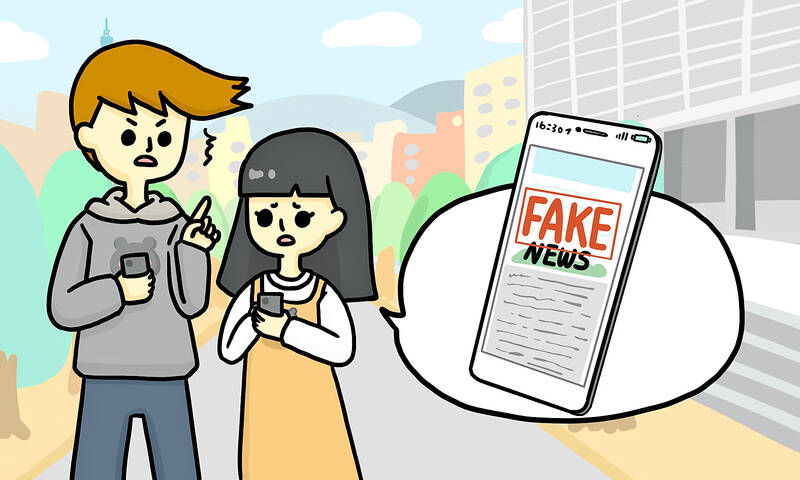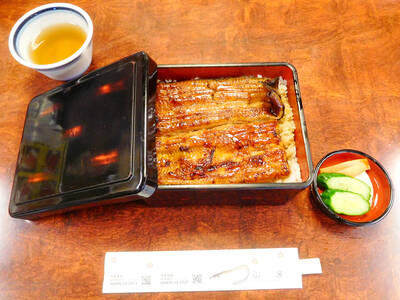對話 Dialogue
小實:馬克,你看!這個影片說美國要收「呼吸稅」了。
Xiǎoshí: Mǎkè, nǐ kàn! Zhège yǐngpiàn shuō Měiguó yào shōu “hūxīshuì” le.

馬克:天哪!小實,這個影片這麼誇張,你也相信嗎?
Mǎkè: Tiān na! Xiǎoshí, zhège yǐngpiàn zhème kuāzhāng, nǐ yěxiāngxìn ma?
小實:我也覺得很誇張,可是很多人傳給我,我就相信了。
Xiǎoshí: Wǒ yě juéde hěn kuāzhāng, kěshì hěnduō rén chuán gěi wǒ, wǒ jiù xiāngxìn le.
馬克:這就是你們中文說的「三人成虎」。
Mǎkè: Zhè jiùshì nǐmen Zhōngwén shuō de “sānrénchénghǔ”.
小實:這個訊息是「假新聞」嗎?
Xiǎoshí: Zhège xùnxí shì “jiǎ xīnwén” ma?
馬克:是啊!我已經查證過了,這個是網友惡搞的。
Mǎkè: Shì a! Wǒ yǐjīng cházhèng guò le, zhège shì wǎngyǒu ègǎo de.
小實:哇!我被騙了!我要趕快告訴傳影片給我的人。
Xiǎoshí: Wa! Wǒ bèi piàn le! Wǒ yào gǎnkuài gàosù chuán yǐngpiàn gěi wǒ de rén.
馬克:還要叫他們以後多注意那些沒有來源的訊息哦。
Mǎkè: Háiyào jiào tāmen yǐhòu duō zhùyì nàxiē méiyǒu láiyuán de xùnxí ó.
翻譯 Translation
Xiaoshi: Mark, look! This video says that the United States is going to have a “breathing tax.”
Mark: Oh my God! Xiaoshi, this video is so over the top, you don’t believe it, do you?
Xiaoshi: I also thought it was over the top, but many people sent it to me, so I believed it.
Mark: This is what the Chinese idiom “When three people call something a tiger, it is a tiger” means.
Xiaoshi: Is it “fake news,” then?
Mark: Yes! I have verified that this is a prank by netizens.
Xiaoshi: Wow! I was fooled! I need to immediately tell everyone who sent me the video.
Mark: And also tell them to pay more attention to unsourced messages in future.
單字片語 Vocabulary
1. 影片 (yǐngpiàn) video
2. 誇張 (kuāzhāng) exaggerate
3. 傳 (chuán) to send, to spread
4. 三人成虎 (sānrénchénghǔ)
[Chinese Idiom] lit. When three people call something a tiger, it is a tiger; Woozle effect.
5. 訊息 (xùnxí) message, information
6. 假 (jiǎ) fake
7. 查證 (cházhèng) to verify
8. 惡搞 (ègǎo) parody, to spoof
9. 騙 (piàn) to cheat; to fool
10. 來源 (láiyuán) source
教材音檔 Audio Files
教材影片 Video Files:
https://www.instagram.com/celc.nou_tw/guide/_/17999106352646292/
實踐大學華語中心提供
By Shih Chien University Chinese Language Center: https://chineseusc.com/

Microsoft on Feb. 28 announced it was retiring Skype, the online voice and video call pioneer that the tech titan acquired in 2011. “Starting in May 2025, Skype will no longer be available,” said a post from Skype support on X, directing users to sign into Microsoft’s Teams platform for further use of its services. Skype was founded in 2003 by Scandinavians Niklas Zennstrom and Janus Friis in Estonia, revolutionizing Internet communication by offering free voice calls between computers and affordable rates for calls to landlines and mobile phones. Over the years, and as Internet speeds improved, Skype evolved to

People desire a sense of purpose in their lives, but they often remain idle unless they have a clear reason to act. This concept is illustrated by the retirement paradox. People work hard to prepare for a future without work but find life meaningless after achieving that goal. A study was carried out to determine if a reason, even a minor one, could encourage idle people to take action. __1__ Upon finishing the first, they were instructed to drop it off at a location either right outside the room or at a spot farther away, which would take around

Donburi, often simply called don, is a beloved Japanese dish that consists of a bowl of steamed rice topped with various other ingredients. The word donburi itself actually means “bowl” in Japanese, but it has come to represent much more than just a vessel. Donburi first emerged during the Edo period (1603–1867) as a quick and convenient meal for busy city dwellers. By the 19th century, donburi had become immensely popular among theater enthusiasts, who often purchased these portable meals to enjoy during long performances. Una-don, a donburi topped with grilled eel, was a particular favorite. Easy-to-carry and satisfying,

Continued from yesterday(延續自昨日) https://www.taipeitimes.com/News/lang Results showed that only 32 percent were willing to walk farther for the same candy, but 59 percent chose to do so when promised different candy. Researchers also discovered that students who walked farther reported feeling happier during the wait. __3__ Idleness aversion can be applied in various settings. For example, Uber uses animations and real-time updates to keep customers from being bored while waiting. It can also be used in the design of office buildings to reduce elevator traffic. During busy times, it takes a while to wait for an elevator. __4__ Recognizing the power